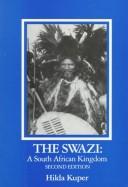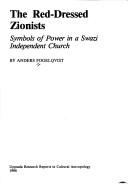| Listing 1 - 10 of 18 | << page >> |
Sort by
|
Book
ISBN: 0566005530 0865312338 Year: 1983 Publisher: Boulder Westview
Abstract | Keywords | Export | Availability | Bookmark
 Loading...
Loading...Choose an application
- Reference Manager
- EndNote
- RefWorks (Direct export to RefWorks)
Swaziland. --- Svazilend --- kaNgwane --- Umbuso weSwatini --- Kingdom of Swaziland --- Swaziland Government --- Ngwane --- Swasieland --- スワジランド --- Suwajirando --- スワージランド --- Eswatini

ISBN: 0810837498 Year: 2000 Volume: 80
Abstract | Keywords | Export | Availability | Bookmark
 Loading...
Loading...Choose an application
- Reference Manager
- EndNote
- RefWorks (Direct export to RefWorks)
908 <683.4> --- Heemkunde. Area studies--Swaziland --- Swaziland --- Svazilend --- eSwatini --- kaNgwane --- Umbuso weSwatini --- Umboso wakaNgwane --- Kingdom of Swaziland --- Swaziland Government --- Ngwane --- Swasieland --- スワジランド --- Suwajirando --- スワージランド --- Kingdom of eSwatini --- Encyclopedias --- Eswatini
Book
ISBN: 9012051754 Year: 1985 Publisher: 's-Gravenhage Staatsuitgeverij
Abstract | Keywords | Export | Availability | Bookmark
 Loading...
Loading...Choose an application
- Reference Manager
- EndNote
- RefWorks (Direct export to RefWorks)
Regional documentation --- Swaziland --- 908 <683> --- SZ / Swaziland --- 37 --- Geografische economie. Monografieën van streken en landen. --- Economic conditions. --- Description and travel --- Description and travel. --- Geografische economie. Monografieën van streken en landen --- Svazilend --- kaNgwane --- Umbuso weSwatini --- Kingdom of Swaziland --- Swaziland Government --- Ngwane --- Swasieland --- スワジランド --- Suwajirando --- スワージランド --- Eswatini

ISBN: 0030702399 Year: 1986 Publisher: New York (N.Y.): Holt, Rinehart and Winston
Abstract | Keywords | Export | Availability | Bookmark
 Loading...
Loading...Choose an application
- Reference Manager
- EndNote
- RefWorks (Direct export to RefWorks)
Swazi (African people) --- Amaswazi (African people) --- Isiswazi (African people) --- Ngwane (African people) --- Siswazi (African people) --- Swati (African people) --- Swazi (African tribe) --- Tekela (African people) --- Tekeza (African people) --- Bantu-speaking peoples --- Ethnology --- Nguni (African people) --- Swaziland --- History. --- Swazi (African people). --- Svazilend --- kaNgwane --- Umbuso weSwatini --- Kingdom of Swaziland --- Swaziland Government --- Ngwane --- Swasieland --- スワジランド --- Suwajirando --- スワージランド --- Eswatini

ISBN: 0511563027 0521242703 0521523001 Year: 1983 Volume: 31 Publisher: Cambridge : Cambridge University Press,
Abstract | Keywords | Export | Availability | Bookmark
 Loading...
Loading...Choose an application
- Reference Manager
- EndNote
- RefWorks (Direct export to RefWorks)
This is the first full-length study of the political economy of one of the African states which were formed in the course of the nineteenth-century Zulu revolution. The early chapters examine the evolution of the Swazi state and the dynamics of its stratified systems, paying particular attention to the 'layering' of inequality through marriage and inheritance patterns, and the simultaneous integration of age regiments and the elaboration of a national ideology based on the Swazi royalty. Dr Bonner then sets the Swazi state in the wider context of south-eastern Africa and discusses its relations with the surrounding Boer societies. The later chapters analyse the role played by the great mining companies and their white concessionaires in the partition of southern Africa and in bringing about the dissolution of the Swazi state.
Swazi (African people) --- Amaswazi (African people) --- Isiswazi (African people) --- Ngwane (African people) --- Siswazi (African people) --- Swati (African people) --- Swazi (African tribe) --- Tekela (African people) --- Tekeza (African people) --- Bantu-speaking peoples --- Ethnology --- Nguni (African people) --- Politics and government. --- Eswatini --- Politics and government --- Swaziland --- Svazilend --- kaNgwane --- Umbuso weSwatini --- Kingdom of Swaziland --- Swaziland Government --- Ngwane --- Swasieland --- スワジランド --- Suwajirando --- スワージランド --- Arts and Humanities --- History

ISBN: 9150605054 9789150605051 Year: 1986 Publisher: Uppsala : University of Uppsala. Department of Cultural Anthropology,
Abstract | Keywords | Export | Availability | Bookmark
 Loading...
Loading...Choose an application
- Reference Manager
- EndNote
- RefWorks (Direct export to RefWorks)
#SBIB:39A10 --- #SBIB:39A73 --- Zionist churches (Africa) --- -Christian sects --- Antropologie: religie, riten, magie, hekserij --- Etnografie: Afrika --- Church of Jericho (Swaziland) --- Jericho Church (Swaziland) --- Swaziland --- Religious life and customs. --- Theses --- -Antropologie: religie, riten, magie, hekserij --- Freikirche. --- Zionist churches (Africa). --- Church of Jericho (Swaziland). --- Jericho Church. --- Swasiland. --- Swaziland. --- Christian sects --- Jericho Church (Eswatini) --- Svazilend --- kaNgwane --- Umbuso weSwatini --- Kingdom of Swaziland --- Swaziland Government --- Ngwane --- Swasieland --- スワジランド --- Suwajirando --- スワージランド --- Eswatini --- Églises sionistes (afrique) --- Vie religieuse --- Moeurs et coutumes
Book
ISBN: 9068090887 Year: 1988 Publisher: Amsterdam : Koninklijk Nederlands aardrijkskundig genootschap,
Abstract | Keywords | Export | Availability | Bookmark
 Loading...
Loading...Choose an application
- Reference Manager
- EndNote
- RefWorks (Direct export to RefWorks)
Migrant labor --- Rural-urban migration --- Cities and towns, Movement to --- Country-city migration --- Migration, Rural-urban --- Rural exodus --- Migration, Internal --- Rural-urban relations --- Urbanization --- Labor, Migrant --- Migrant workers --- Migrants (Migrant labor) --- Migratory workers --- Transient labor --- Employees --- Casual labor --- Case studies --- Swaziland --- Svazilend --- kaNgwane --- Umbuso weSwatini --- Kingdom of Swaziland --- Swaziland Government --- Ngwane --- Swasieland --- スワジランド --- Suwajirando --- スワージランド --- Eswatini --- Economic conditions --- Regional disparities --- Case studies. --- Demography --- Labour market --- Social geography
Book
ISBN: 1462348289 1452703981 128356825X 1451888112 9786613880703 Year: 2006 Publisher: Washington, D.C. : International Monetary Fund,
Abstract | Keywords | Export | Availability | Bookmark
 Loading...
Loading...Choose an application
- Reference Manager
- EndNote
- RefWorks (Direct export to RefWorks)
In recent years, the IMF has released a growing number of reports and other documents covering economic and financial developments and trends in member countries. Each report, prepared by a staff team after discussions with government officials, is published at the option of the member country.
Eswatini --- Government of the Kingdom of Eswatini --- Kingdom of Eswatini --- Umbuso weSwatini --- Swaziland --- Economic policy. --- Economic conditions --- Exports and Imports --- Foreign Exchange --- Money and Monetary Policy --- Globalization --- Investments: Commodities --- Trade: General --- Globalization: General --- Monetary Systems --- Standards --- Regimes --- Government and the Monetary System --- Payment Systems --- Agriculture: General --- International economics --- Currency --- Foreign exchange --- Monetary economics --- Investment & securities --- Global competitiveness --- Exchange rates --- Exports --- Currencies --- Imports --- International trade --- Agricultural commodities --- Commodities --- Nominal effective exchange rate --- Money --- Farm produce --- Eswatini, Kingdom of
Book
ISBN: 1462315992 1452723710 1283565382 9786613877833 145274369X Year: 2007 Publisher: Washington, D.C. : International Monetary Fund,
Abstract | Keywords | Export | Availability | Bookmark
 Loading...
Loading...Choose an application
- Reference Manager
- EndNote
- RefWorks (Direct export to RefWorks)
This 2006 Article IV Consultation highlights that Swaziland’s economic performance has remained weak with growth averaging only 2 percent since 2000, owing to a substantial real appreciation of the lilangeni during 2002–04, erosion of trade preferences, recurrent drought, and stagnant investment. Over that same period, rising government expenditures, especially on the wage bill, undermined fiscal sustainability and reduced foreign reserves to critically low levels. Poverty has escalated in the face of high and rising unemployment, food shortages, and the world’s highest HIV/AIDS infection rate.
Fiscal policy --- Finance --- Funding --- Funds --- Economics --- Currency question --- Tax policy --- Taxation --- Economic policy --- Finance, Public --- Government policy --- Eswatini --- Government of the Kingdom of Eswatini --- Kingdom of Eswatini --- Umbuso weSwatini --- Swaziland --- Economic conditions. --- Banks and Banking --- Exports and Imports --- Public Finance --- Diseases: AIDS and HIV --- Health Behavior --- Monetary Policy --- Health: General --- Trade: General --- Monetary Policy, Central Banking, and the Supply of Money and Credit: General --- Fiscal Policy --- Banking --- International economics --- HIV/AIDS --- Health economics --- Monetary economics --- Macroeconomics --- HIV and AIDS --- International reserves --- Health --- Imports --- Monetary base --- Central banks --- International trade --- Population and demographics --- HIV --- Viruses --- Foreign exchange reserves --- Money supply --- Eswatini, Kingdom of --- Hiv and AIDS --- Hiv --- Hiv/AIDS
Book
ISBN: 0253036461 0253036453 0253036445 9780253036469 9780253036445 9780253036452 Year: 2018 Publisher: Bloomington, Indiana
Abstract | Keywords | Export | Availability | Bookmark
 Loading...
Loading...Choose an application
- Reference Manager
- EndNote
- RefWorks (Direct export to RefWorks)
This powerful and original account details how these new matters of death, dying, and funerals have become entrenched in peoples' everyday lives and become part of a quest to create dignity in the wake of a devastating epidemic.
Funeral rites and ceremonies --- Social change --- HIV infections --- AIDS (Disease) --- Social aspects --- Swaziland --- Social life and customs --- Acquired immune deficiency syndrome --- Acquired immunodeficiency syndrome --- Acquired immunological deficiency syndrome --- Immunological deficiency syndromes --- Virus-induced immunosuppression --- HIV (Viruses) infections --- HTLV-III infections --- HTLV-III-LAV infections --- Human T-lymphotropic virus III infections --- Lentivirus infections --- Sexually transmitted diseases --- Change, Social --- Cultural change --- Cultural transformation --- Societal change --- Socio-cultural change --- Social history --- Social evolution --- Funerals --- Mortuary ceremonies --- Obsequies --- Manners and customs --- Rites and ceremonies --- Burial --- Cremation --- Cryomation --- Dead --- Mourning customs --- Svazilend --- kaNgwane --- Umbuso weSwatini --- Kingdom of Swaziland --- Swaziland Government --- Ngwane --- Swasieland --- スワジランド --- Suwajirando --- スワージランド --- Eswatini --- Government of the Kingdom of Eswatini --- Kingdom of Eswatini
| Listing 1 - 10 of 18 | << page >> |
Sort by
|

 Search
Search Feedback
Feedback About UniCat
About UniCat  Help
Help News
News